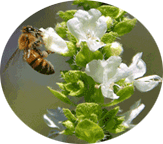How Our Bodies React to Poisons (Toxins)
© Copyright Bee Wilder, March 2011
Poisons, also called toxins, are any substance that causes injury, illness or death of a living organism.
List of General Symptoms Caused by Poisons
- nausea
- vomiting
- diarrhoea (diarrhea)
- stomach pain
- drowsiness, dizziness or weakness
- fever and chills (shivering)
- loss of appetite
- headache or irritability
- difficulty swallowing
- producing more saliva than normal
- skin rash
- double or blurred vision
- seizures (fits)
- coma and death (in severe cases)
Do you see how these symptoms and reactions to poisons are actually natural — as explained in Inflammation and Infection are Natural Healing Processes produced by the body itself in order to maintain its health as best it can, i.e. defend and protect itself against poisons?
There are many references for specific kinds of poisons like mercury, arsenic, carbon monoxide, rat poison, etc. but there aren’t many for overall poisoning reactions. However, you don’t have to look far to find poisoning symptoms and reactions because they are described as "side-effects" for all drugs!
The University of Maine’s Farm Safety Program lists reactions to mild, moderate or severe poisoning as follows:
Mild Poisoning—Headache, fatigue, weakness, dizziness, restlessness, perspiration, nausea, diarrhea, loss of appetite, loss of weight, thirst, moodiness, soreness in joints, skin irritation, eye irritation.
Moderate Poisoning—Severe nausea, severe diarrhea, excessive saliva, stomach cramps, excessive perspiration, trembling, no muscle coordination and muscle twitches, extreme weakness, mental confusion, blurred vision, difficulty in breathing, cough, rapid pulse, flushed or yellow skin, weepy eyes.
Severe Poisonings—Fever, intense thirst, increased rate of breathing, uncontrollable muscle twitches, pinpoint pupils, convulsions, inability to breathe, unconsciousness.
Poisons (Toxins) Also Cause Cell Membrane Defects
Cell Membranes are two layers of fat that surround (enclose) every cell in the body. In other words, the cell membrane is the cell wall. Plant foods (carbs) have cell walls made of fiber, called cellulose that is indigestible.
All poisons (toxins) cause cell membrane defects because toxins make them rigid/stiff, which means that:
- Nutrients, hormones, and water are not as able to get into the cells where they are needed to provide energy, and to repair, rebuild, and detoxify themselves.
- Red blood cells carry oxygen, distributing it throughout the body. They must be flexible enough to squeeze down to about one–seventh their normal size in order to travel into the body’s tiny capillaries. However toxins cause red blood cell walls to become more rigid/stiff, so they have difficulty squeezing into the capillaries, and the transport of life-giving oxygen to all the tissues and organs of the body are impaired. Deprived of sufficient oxygen, tissues and organs lose their ability to function.
- White blood cells will also be stiff, so they are not as able to to perform their specialized duties:
- They create inflammation as the result of an injury in order to detoxify, repair, and rebuild the area.
- They produce substances that detoxify and/or neutralize toxins – they are mainly pus which is found around all inflammations.
- They pick up toxins throughout the body and dispose of them through various elimination organs like the mucus membranes, liver, skin, kidneys, lungs, intestines, etc. which also creates inflammation.
- Organs and systems that create hormones, i.e. the pancreas, intestines, adrenals, pituitary, thyroid, etc. are not as able to function like they should, resulting in low hormones levels, i.e. insulin for regulating blood sugar, hormones for digestion, thyroid hormones for regulating metabolism, etc.
- All organs, functions, and systems throughout the body are not as able to function like they should.
Cells Not Constructed As Nature Intended Are Weak
The body’s cells can only be healthy if their cell membranes are constructed out of 50% saturated fat, i.e. unrefined coconut oil, butter, lard and other natural animal fats. The lung cells are an exception, because they need to be constructed out of 100% saturated fat.
In Saturated Fats and the Lungs Mary G. Enig, PhD writes “When people consume a lot of partially hydrogenated fats and oils, the trans fatty acids are put into the phospholipids [fats] where the body normally wants to have saturated fatty acids and the lungs may not work effectively.”
When our body’s cell membranes are constructed as nature intended they do not allow harmful toxins to enter, and they are better able to intake and utilize nutrients, hormones, oxygen, and water, and get rid of their natural waste products.
Unnatural Fats and Oils Damage the Entire Body, so they should not be consumed by anyone!
Unfortunately the body will incorporate unnatural fats and oils into every cell, which changes the structure of the cell membranes. When these plastic–like fats and oils are incorporated into the cells it makes them flabby, meaning “out of condition” and “not strong.” Weak flabby cell membranes allow toxins to enter them, which further damages health.
Eliminate Sources of Poisons (Toxins) Listed in These Articles
- There Are No “Safe” Psychiatric Drugs.
- How the Medical and Drug Industries Create their Sickness Business
- Genetic Engineering, Playing God in the Garden
- Aspartame and MSG are Neurotoxins.
- 143 Reasons Why Sugar is Ruining Your Health.
- Household Toxins Checklist.
- Environmental Toxins.
How to Get Healthy
- Consume the correct combination of nutrients that all Humans need in order to be healthy — see
Nutrients Required for Human Health and Healing and Food Selection for Humans. - Eliminating poisons (toxins)
We need to take charge of our own health and well–being by following Nature’s Laws on Health.
